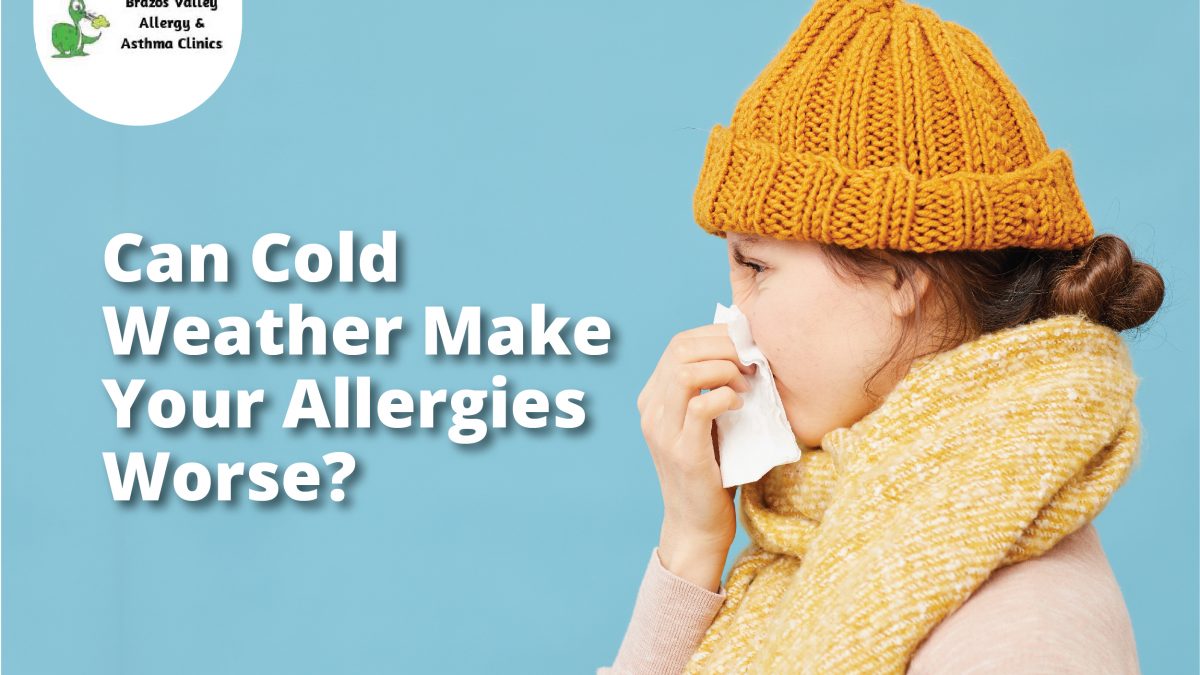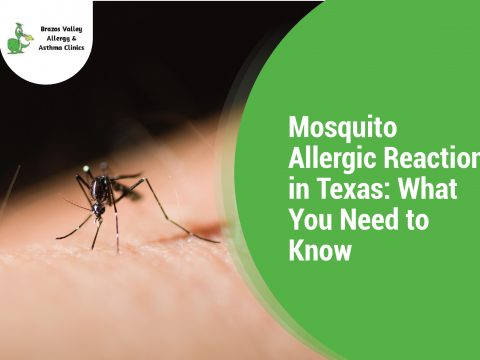- 979-485-9287
- office@bvallergy.com
-
 979-251-7804
979-251-7804
Can Cold Weather Make Your Allergies Worse?

How to Survive Your Winter Allergies
December 21, 2021
I’m Allergic to Peanuts; What Should I Look Out For?
January 27, 2022Cold weather can be challenging for people with indoor allergies. In winter, your allergies might also flare up because of mold, dust mites, and animal dander. Spending more time indoors makes you susceptible to indoor allergens that trigger allergy symptoms. However, don’t panic — there are ways to minimize your allergies in winter.
So, Why Does Cold Weather Make Your Allergies Worse?
Some people enjoy winter more than any other season. Winter is a delightful time for making fires in the fireplace, wrapping up for the cold, and even venturing outside. In contrast, cold weather can pose various health problems for asthma or specific allergies.
Why your cold-weather allergies may get worse:
-
For allergy sufferers with underlying allergies, cold air can be bad luck. Although cold weather doesn’t directly cause respiratory allergies, it can exacerbate allergy symptoms such as congestion and runny nose.
-
The cold air we breathe causes nasal congestion in two different ways. First, cold air activates a body defense mechanism called mucus transport, which causes mucus production to increase, causing a runny nose. Through this, your body protects itself from nasal intruders. The second reason cold air affects your nose is that your nose warms the air you breathe to your body temperature. Your capillaries dilate when you breathe cold air, bringing warm blood to heat it. Nasal congestion and stuffiness are more common due to dilated capillaries.
-
Cold air can aggravate asthma attacks, too. It often provokes asthma symptoms. However, upper respiratory infections may trigger asthma attacks during the winter. Cold air isn’t infectious, but it affects the respiratory system. The lungs react to cold air by releasing histamine, leading to bronchial congestion and wheezing.
-
Furthermore, the winter is peak cold and flu season. These infections can lead to severe flare-ups, leading to pneumonia and even hospitalization. Flu is a viral respiratory infection spread by air and physical contact. Viruses can remain on many surfaces for up to two hours. Due to this, people nearby may inhale germ-laden particles when they sneeze or cough.
-
Winter also presents poorer indoor air quality due to closed windows and doors. It prevents fresh air from circulating and increases household allergen concentrations. If you try to stay warm indoors, you’ll likely have to deal with dust mites, mold, and pet dander. Likewise, snuggling by the fire with smoke irritating the nose and lungs can exacerbate symptoms. Turning on the heating system can also make things worse.
Cold weather and allergies may have a connection. As a result, if you wonder why your allergies worsen, consider the weather.
How to Prevent Your Allergies From Getting Worse
Consider the following measures to reduce your exposure to indoor allergens during the winter:
- Keep removable upholstery covers clean by washing them in hot water regularly.
- Dehumidifiers can help reduce indoor moisture. Maintain humidity levels between 30 and 50 percent.
- Seal cracks in your doors, windows, and walls so that winter air can’t blow in.
- When it gets cold, be sure to wear protective clothing like jackets, hats, gloves, and scarves. Limit skin exposure to cold temperatures.
- Don’t hang your clothes to dry. Doing so can help keep your clothing free from allergens.
- Keep pets out of bedrooms and away from contact to avoid accumulating allergens.
- Cover your bedding, pillows, and mattresses to prevent dust mites from thriving.
- Test the water’s temperature before getting in and avoid frigid water.
- Ensure no leaks are present in your bathroom, basement, roof, or pipes, so moisture does not build up to promote dust mites, mold, or roaches.
- Limit your pets’ time indoors. If you cannot keep them outside, keep them out of your bedroom, living room, or kitchen.
- Install tile, laminate, or wood in place of carpeting.
- Drink room-temperature beverages without ice.
- Don’t consume cold foods like ice cream.
- Don’t use down pillows or comforters, which attract dust mites and cause allergies.
- Remove any mold growth with a solution of water and 5 percent bleach.
- Clean your home regularly with a vacuum. To remove allergens from most surfaces, use a vacuum with a HEPA filter.
- Make sure you clean up any leftovers or crumbs in your dining area after you eat.
- If you are suffering during the winter months, ask someone else to dust and vacuum.
Important Reminders
Outdoor-allergy avoidance measures may not be effective for indoor allergies. While you may not be able to avoid cold weather altogether, you can take some steps to prevent allergic or asthmatic reactions:
-
Keep an eye on the daily weather forecast. As extreme cold can cause severe reactions, it may be best not to go outside on frigid days.
-
Pay attention to mold and pollen counts when checking the forecast. If either of these counts is high, you should stay the entire day indoors. In extreme cold, wear clothing that covers your mouth and nose.
-
If your doctor recommends it, take an antihistamine before suffering from allergies in winter.
-
Always carry epinephrine for an emergency, which you can inject into your outer thigh. Speak with an allergist at your trusted allergy and asthma clinic for the best medication.
BVAllergy Can Help
Paul Jantzi has spent more than 13 years serving the south-central Texas region as an allergist. He is board-certified in allergy and immunology with prior specialty training in pediatrics and internal medicine. Schedule a meeting with him to learn more about immunotherapy and how it can help with your allergy symptoms.




